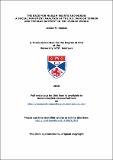The race for Muslim hearts and minds : a social movement analysis of the U.S. war on terror and popular support in the Muslim world
Abstract
According to conventional wisdom winning hearts and minds is one of the most important goals for defeating terrorism. However, despite repeated claims about U.S. efforts to build popular support as part of the war on terror during the first seven years after 9/11, a steady stream of polls and surveys delivered troubling news. Using a counterinsurgency and social movement informed approach, I explain why the United States performed poorly in the race for Muslim hearts and minds, with a specific focus on problems inherent in the social construction of terrorism, the use of an enemy-centric model while overestimating agency, and the counterproductive effect of policy choices on framing processes.
Popular support plays wide-ranging roles in counterterrorism, including: influencing recruitment, fundraising, operational support, and the flow of intelligence; providing credibility and legitimacy; and, sanctifying or marginalizing violence. Recognizing this the U.S. emphasized public diplomacy, foreign aid, positive military-civilian interactions, democracy promotion, and other efforts targeting populations in the Muslim world.
To explain the problems these efforts had, this thesis argues that how Americans think and talk about terrorism, reflected especially in the rhetoric and strategic narrative of the Bush administration, evolved after 9/11 to reinforce normative and enemy-centric biases undermining both understanding of the underlying conflicts and resulting efforts. U.S. policy advocates further misjudged American agency, especially in terms of overemphasizing U.S. centrality, failing to recognize the importance of real grievances, and overestimating American ability to implement its own policies or control the policies of local governments. Finally, the failure to acknowledge the role of U.S. policies counterproductively impacted contested framing processes influencing the evolution of mobilization. The resulting rhetoric and actions reinforced existing anti- American views, contributed to the perception that the war on terror is really a war on Islam, and undermined natural counter narratives.
Type
Thesis, PhD Doctor of Philosophy
Collections
Items in the St Andrews Research Repository are protected by copyright, with all rights reserved, unless otherwise indicated.

